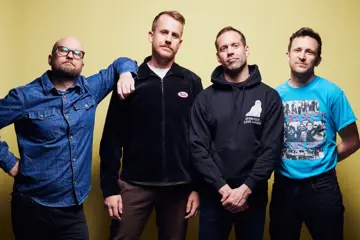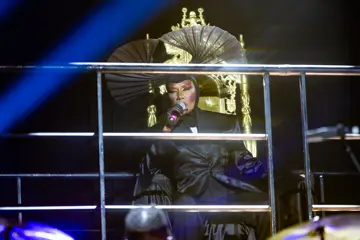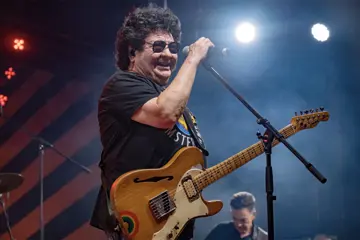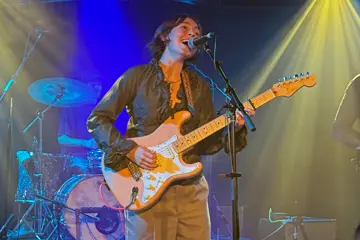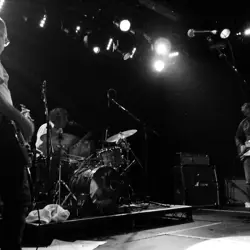 The Clean
The CleanThe city of Dunedin is located at the very bottom end of New Zealand’s South Island, making the windswept municipality one of the most far-flung outposts on the planet. And if geographical isolation is an issue today for Dunedin and its residents, imagine a few decades ago before the advent of technology had the effect of bringing the entire planet closer together (in a virtual sense at the very least). It was secluded and sedate, hardly the place where you would expect any form of cultural upheaval, yet it was here in the late ‘70s and early ‘80s that Dunedin spawned a host of punk-inspired indie outfits which would go on to influence generations of bands all over the planet.
Taking their cues from the artier end of the rock spectrum (The Velvet Underground and The Stooges in particular) and mixing it with jangly, ‘60s-sounding guitars inspired by bands such as The Byrds, Kiwi acts such as The Clean, The Chills, The Verlaines and The Tall Dwarfs were soon putting their city on the musical map with what became known as the ‘Dunedin Sound’. Come the ‘80s, they even had one of the great indie labels documenting the scene in the form of Christchurch-based Flying Nun Records. The unique sounds that these bands (and their many contemporaries) concocted were eventually co-opted by bands all over the globe, inspiring disparate acts such as Pavement, REM, Yo La Tengo, Superchunk and too many others to mention. It’s still resonating to this day, and can be traced (in both spirit and sound) to garages and pubs everywhere.
Of all these seminal Dunedin bands, however, it’s The Clean who have arguably left the greatest legacy. By about 1980, the band’s ‘classic line-up’ of David Kilgour (vocals/guitar), his brother Hamish (drums) and bassist Robert Scott (also frontman for The Bats) had coalesced, releasing a couple of experimental-sounding EPs and a handful of singles before promptly disbanding and remaining inactive for much of the ‘80s. When they reformed at the end of that decade, they’d settled on a slightly more accessible vibe and, in their sporadic forays together in the intervening years, they’ve since put out five studio albums (plus numerous compilations and live recordings), crafting a body of work that has made them cult heroes the world over. When they reform for shows and tours these days it’s seen as a special event, and their impending Australian sojourn qualifies if only because – despite the proximity and cultural similarities of our respective countries – The Clean have only played here a handful of times in the last few decades.
It’s funny because [Australia]’s so close, but I’ve only ever been there once as a solo act and this will be The Clean’s third visit in 30 years, so somehow we’ve just overlooked Australia.
“We’re playing some places that we’ve never played before this time, so that’s really fun,” David Kilgour explains. “We’re doing Perth and Tasmania – we’ve never played there before, so looking forward to it. We’ve just been busy with other things really, I suppose. We’re always heading to America and Europe, and I think we’ve never really looked upon Australia that much as a market. It’s funny because it’s so close, but I’ve only ever been there once as a solo act and this will be The Clean’s third visit in 30 years, so somehow we’ve just overlooked Australia. You can only do so much at one time, right? You can’t do everything.”
Don't miss a beat with our FREE daily newsletter
All of the band members have other projects when not reunited as The Clean – Kilgour himself has a long-term solo career as well as a band called David Kilgour & The Heavy Eights, who this year released their third album, End Times Undone – but he attests that he still loves getting back into action with his longest-serving bandmates.
“Yeah, I do – I wouldn’t do it just for the money,” he offers. “I still do enjoy it, absolutely. Sometimes I might moan about it, but I love being onstage with The Clean – it’s just pure enjoyment, really. We really wouldn’t keep doing it if we didn’t enjoy it, even if the money was huge. The nice thing about it now is that there’s no grand plan for me or The Clean, I don’t have any grand illusions about what’s going to happen next. The Clean will only really go places now when we get asked to go – we don’t really map out our year or anything – so this time around it’s because of the festivals we were invited to. Plus there’s been a bit more interest this year because of [2002 collection of early material] Anthology coming out on vinyl, and we toured America three months ago to push that, so all of the activity this year is surrounding the Anthology box-set.”
Does Kilgour have a new appreciation now for The Clean’s music when he returns to it each time after a lengthy lay-off?
“I can’t really remember our mindset from back then, but I think every time we play a song we try to find something new in it, so in some ways it’s like we’re revisiting it but we’re trying to reinvent a little bit,” he tells. “And we’re doing a bit more of that these days to make it more interesting for ourselves. A couple of songs we stick to the [established] arrangements, but even then it’s open-ended – luckily most of the songs, especially the really old stuff, are only one, two or three chords, so we really can muck around with them. We’ve never even done the same shit every night, although we do stick to the same basic core of early songs from the ‘80s – even there we try to mix it out. Every tour we try to pull some odder more left-field stuff out and do a bit more of that, but it’s all pretty much based around the old songs really.”
It’s quite remarkable how well The Clean’s music has stood the test of time, probably because it was never properly indicative of any temporal moment in the first place. It still sounds fresh and, most importantly, is still finding its way to new ears, which is one of the reasons that they sporadically accept invitations to get the band back together.

“I don’t know, man, it just continually blows my mind that people are still finding out about us and that people still want us to go and play,” Kilgour marvels. “In some ways it’s got bigger and bigger for us; every year there’s a little bit more interest and then a little bit more again – it’s like incremental, the growth. Every time we go back to America it’s just a little bit bigger, we’ll play slightly bigger clubs, and it just seems to grow and grow. It just blows my mind; it’s unfathomable, really.
"This last American tour, it depended on the city, but some of the crowds were just young kids – 20-year-olds – and they’ll be fanatics and know all about us already. I’ll ask them, ‘When did you find out about us?’ and they’ll go, ‘Like three months ago?’ and it’s, like, ‘Wow!’ It’s completely endearing, it really is. I asked one of the kids recently, ‘Why? Why? Why? Why? Why am I here again?’ and he just said, ‘Because of the music! It’s good music.’ There you go. I think having the Anthology coming out on CD over there all those years ago really did ratchet things up for us over there. It got across a lot of people it seems.”
We turn our attention to the tiny-but-beautiful Dunedin itself, and how strange it still seems that such a small and outwardly sleepy locale ended up playing such a big role in the rich tapestry of the global music scene.
“Oh man, in the mid-‘70s – even compared to what it’s like now, it’s so sleepy still – but back then it was like being in the ‘50s, man,” Kilgour laughs. “It’s come a long way since then, but it’s still a sleepy little town. Sometimes I think it’s just a big village, and sometimes I think it’s more of a small city – I’m not sure what it is, really – but it’s a funny wee place. The people are great.
I guess I’m talking like an old man now, but … record stores were like rock’n’roll clubs for people in a town – they were like watering holes for people, a gathering place for people. A community.
“Generally speaking, we were [culturally] behind [back in the day] – we’d get the NME three months later, and something like [the Sex Pistols’ debut] Never Mind The Bollocks might come out three months later, but we were lucky because we had a few friends who were mad about music and Hamish and I were vinyl junkies as kids, really – as young kids we were just mad about music and we bought music all the time. Then in the mid-‘70s we had a friend who opened up a record store and he started importing records, so we were pretty lucky because we were getting stuff like [Sex Pistols singles] Pretty Vacant and God Save The Queen and everything else like a week or two after they came out in London. We were also getting air-mailed NMEs coming in and air-mailed New York Rocker magazines from New York City, so we were quite lucky in that respect.
“There was a whole bunch of us who really sought stuff out, and if we heard that someone had a new record in town – say, if someone had the new Buzzcocks album – we’d go over there and try to get it off them. That was kind of like fun, though – it was fun doing that. Now it’s all so easy – there’s something lost in that quest. There’s no search, there’s no experience. I think it was Genesis P-Orridge out of Throbbing Gristle who said that something magic has been lost in that search – he talked about the first time he went down to London as a kid to find some records he was after, and he met some people in a record store and took him back to a flat and got him stoned for the first time, then he met some crazy people and had a religious experience and then hitched back home the next day – that’s all gone. It’s all gone, and that’s a big hole in people’s lives, really. I guess I’m talking like an old man now, but it’s kinda sad. Record stores were like rock’n’roll clubs for people in a town – they were like watering holes for people, a gathering place for people. A community.”
What about the fabled ‘Dunedin Sound’ – everyone’s aware of its eventual import now, but were they even loosely aware of its existence at the time?
“In the late ‘70s, we were just three young men in a rock’n’roll band trying to get by, no one was talking about the ‘Dunedin Sound’ and the Flying Nun scene and how far it was going to go and all of that sort of crap; we were just a really ambitious little band that wanted to do our own thing,” Kilgour recalls. “Five years later we’re in the ‘Flying Nun/Dunedin Sound’ basket, and I think it’s important to remember that – that whole thing about the Dunedin Sound and the legend didn’t start to evolve until about the mid- to late ‘80s, I suppose.

“We kind of started just after The Enemy started here – Chris Knox’s old band – and we were pretty much on our own until much later. Generally speaking, bands like The Chills and The Verlaines and The DoubleHappys were all a bit younger than us, so I guess we were one of the first to start up and they all followed along. Everyone knew everyone – if you were crazy about music back then, you probably knew everyone else who was crazy about music in Dunedin. You’d probably meet at the same gigs – we had the old pub circuit that peaked here in the ‘70s, quite similar to Australia. It was huge, with bands touring all the time and every town had a couple of big pubs and if a band came to town they’d probably do three nights, and maybe a Saturday afternoon show as well, then go to the next town. It was kind of like that.”
It’s only been a handful of years since The Clean released their latest album (2009’s Mister Pop), and Kilgour believes that there could well be more new music down the track.
“We did have a go at it a year or two ago, but then the Christchurch earthquake got in the way of that and we haven’t really returned to it,” he tells. “It’s possible, but it’s quite hard to get us all in the same place at the same time with the same attitude and motivation, I suppose. We don’t plan those things, really. We’ve always kind of jammed a lot [to write] – sometimes we’ll bring ideas in, sometimes even bring in fully formed songs, but we do jam a lot. Hamish and I can sit down and write a lot together – I might come up with a chord progression and maybe a basic melody idea, and Hamish will fill in the rest. We used to do that quite a bit in the early days.
“[Songwriting’s] always something you’ve got to work hard at, but in the last year or so it’s got a lot easier for me. I’m not sure why. I think I think less about it now and I don’t write so much, I just get The Heavy Eights together and we see what we can record straight away and come up with. It seems to be working.”



